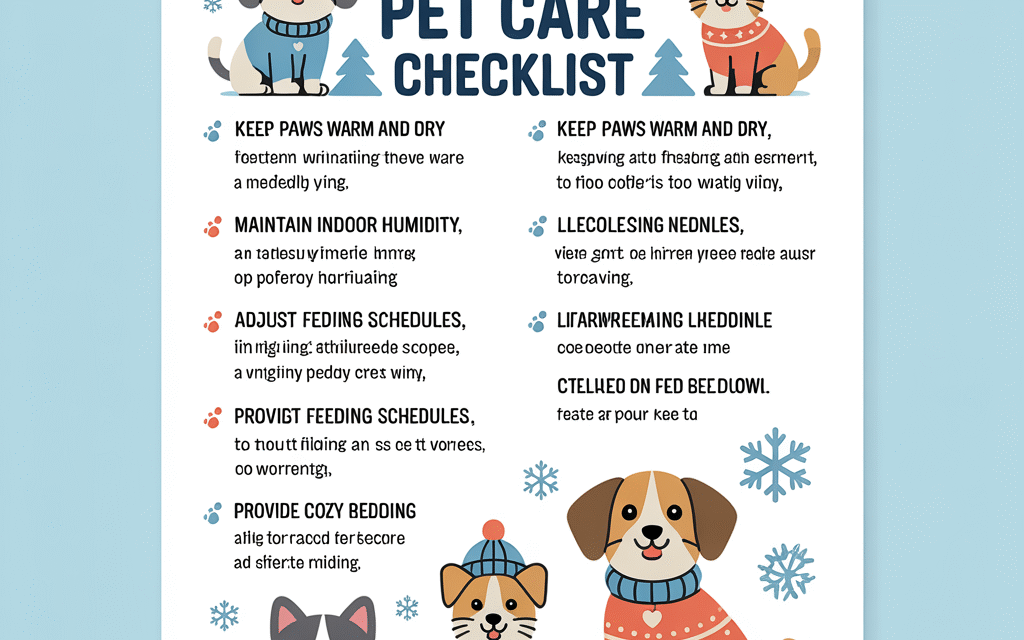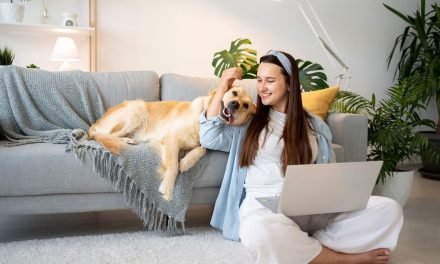✅ The Ultimate Winter Pet Care Checklist (Backed by Science, Built for Real Life)
Because winter changes everything for your pet—and they’re counting on you to notice.
Quick-Read Checklist (the one vets wish every owner printed)
- Coat or sweater for short-hair and senior pets
- Paw protection: balm before walks, warm rinse afterward
- Hydration monitoring (yes, pets get dehydrated in winter)
- Humidity 40–60% inside the home
- Indoor enrichment during weather lockdown days
- Updated ID, microchip, and emergency winter kit
This list looks simple.
The impact isn’t.
When the Temperature Drops, Your Pet’s Biology Changes
Cold creeps in quietly.
First into their paws.
Then into their joints.
Eventually into their mood.
Winter brings cracked paw pads, dry skin, decreased hydration, and—if we’re honest—a touch of cabin fever for everyone. Your pet can’t tell you something feels off. They rely on you to sense the shift.
You don’t need to be perfect.
You just need a plan.
This is that plan.
Hydration & Nutrition: The Two Essentials Most Owners Miss
When the weather turns cold, we rarely think about water. The bowl still sits there. It still looks full.
But here’s the truth:
Heated indoor air dehydrates pets faster than July sun.
Cold air increases respiratory water loss. Your pet may not act thirsty. They just quietly dry out.
Warm broth or a splash of wet food helps hydration feel like a treat. Some pets instinctively drink more when water is warmer—you’ll see it the first time you try.
And if winter playtime outside ramps up their calorie burn?
Just ask your vet:
“Should I increase calories based on activity?”
It’s a five-second question that can prevent fatigue, weight loss, or a weakened immune system all season long.
Skin, Fur, and The Winter Itch
Winter steals moisture from everything—skin, nose, paws, coat.
You’ll notice it when you scratch behind their ears and tiny flakes float like snow.
Your pet doesn’t need constant baths right now.
They need protection.
Brush regularly to distribute oils.
Add omega-3s—food for the skin barrier.
Run a humidifier and watch the itching ease within days.
The skin heals quietly in winter.
It’s the micro-decisions that matter.
When Cold Hits the Joints
If your pet hesitates at stairs, paws at their bed before lying down, or stops halfway through a familiar jump…
That’s winter speaking through their joints.
Warm-up play before the walk isn’t silly.
It’s science—movement activates joint fluid and reduces stiffness.
A non-slip runner or a single cheap yoga mat becomes a confidence runway.
For seniors, supplements help:
- Glucosamine
- MSM
- Omega-3 fatty acids
Not because “they’re getting old,”
but because cold amplifies what already hurts.
Turning Your Home Into a Winter Sanctuary
You know that chair you avoid because of the draft?
Your pet does too.
Heat rises. Floors stay cold. Tile is even colder.
Senior pets feel it most.
Consider:
- Placing beds away from exterior doors
- Using raised cots or memory foam beds
- Avoiding garages or unheated basements
Safety isn’t dramatic.
It’s intentional.
When You Step Outside — Paw Safety Comes First
Winter sidewalks are a chemistry experiment:
Ice melt. Salt. Antifreeze.
All of them end up on paws.
Balm before the walk acts like invisible armor.
Boots are the next level—especially below freezing.
If you wouldn’t walk barefoot on that surface, neither should they.
When you come back inside:
- Warm rinse
- Soft towel dry
- Quick look between pads for hidden ice crystals
It takes thirty seconds.
It prevents cracks that take weeks to heal.
Do They Need a Coat? Let Your Eyes Decide
Here’s the real rule:
Fur does not guarantee insulation.
Short-haired breeds, thin-bodied breeds, seniors, and small dogs lose heat fast. They shiver. They tuck their tail far under their body. They hurry toward home.
That’s not stubbornness.
That’s discomfort.
A coat isn’t an accessory.
It’s dignity.
The Indoor Enrichment Reset
Winter steals movement.
Energy has nowhere to go.
Behavior issues are simply… overflow.
Instead of fighting it, channel it.
Try:
- Treat hide-and-seek behind pillows
- Puzzle toys or slow-feeding bowls
- A “towel burrito” with hidden snacks
- Hallway fetch or controlled stair sprints
Ten minutes of mental challenge exhausts them more than a mile-long walk.
If your pet is bored, they’ll invent their own entertainment.
You’ll rarely like their version.
What Most Owners Forget Before Their Winter Vet Visit
Bring this list on your phone:
- Should I adjust calories based on cold weather activity?
- Which supplements are best for joint comfort?
- What temperature should trigger indoor-only time?
- Is a coat necessary for my pet’s breed and age?
Vets love when owners show up prepared.
You become a partner, not a patient.
The Winter Emergency Kit
(The thing we hope you never need.)
- A blanket that actually insulates
- Slip lead (if a collar breaks)
- Collapsible water bowl
- Pre-measured food bags
- Backup power bank for your phone
- Updated microchip and ID information
Emergencies don’t schedule themselves.
Preparation is the quiet language of love.
Questions Pet Owners Ask When Winter Hits Hard
How do I know if my pet is actually cold?
Watch for curled posture, tucked tail, shivering, or sudden stubbornness on walks. Pets don’t fake discomfort.
What’s the safest way to protect paws from salt and ice melt?
Boots give full protection, but balm is better than nothing. Rinse and dry after every walk.
Do pets get dehydrated in winter?
Yes—faster than you think. Heated indoor air pulls moisture from skin and lungs.
Are heated beds safe?
Yes, as long as they have auto-shutoff and your pet can move away from the heat if they want to.
PRODUCTS / TOOLS / RESOURCES
These are not sponsorships or ads—just items that make winter easier:
Paw Protection
- Natural paw balm (beeswax + shea)
- Dog boots with rubber soles for traction
Warmth & Bedding
- Memory foam bed + washable cover
- Raised bed to avoid cold floors
- Heated pad with automatic shutoff timer
Hydration & Skin
- Omega-3 fish oil supplement
- Ceramic water bowl (stays warmer than metal)
- Humidifier (40–60% humidity)
Joint Support
- Glucosamine + MSM blend for mobile seniors
- Non-slip area rugs or yoga mats
Winter Walking Gear
- Reflective leash for early nightfall
- Weatherproof coat for small or short-hair pets
When winter becomes a season of preparation—not fear—your pet moves through it with comfort, confidence, and ease.






Recent Comments